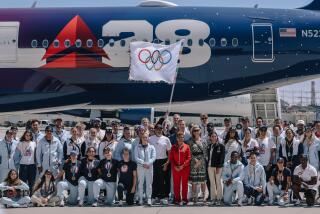Greece, amid debt crisis, is limping toward London Olympics
ATHENS, Greece — Ancient Greeks invented the Olympics and the nation’s athletes have remained loyal participants throughout the years, but contemporary Greeks are struggling to make the Summer Games in London.
With less than three weeks before the May 10 flame-lighting ceremony at Ancient Olympia, which starts the official countdown to the late-July opening of the Games, Olympic preparations are limping along because of Greece’s economic crisis and the government’s austerity measures. Both the government and the athletes are scrimping and saving to send a modest team to London.
“It’ll happen,” said Dimitris Evangelopoulos, the country’s national track and field coach. “We have the [government’s] assurances. But how can you really train under the pain of austerity?”
This month, the Greek Track and Field Federation suspended all domestic competitions because of cutbacks totaling about a third of its $10-million annual budget. The federation, which represents about 20,000 athletes, has left scores of coaches and support staff members unpaid for nearly 10 months.
Promises of stipends and civil-service jobs to star athletes, in exchange for a commitment to training, have been canceled. And a three-year $40-million budget for grooming future Olympians has been slashed by more than a half.
But Greece has never missed a Summer or Winter Olympics since the Games’ modern revival in Athens in 1896, even though the public purse was in a parlous situation back then. The government had defaulted on its debt three years earlier and ceded control of its finances to a commission of European technocrats.
Now, 116 years later, Greece has had to sign up for two international bailouts, and European officials are once again monitoring its balance sheet. To plead financial difficulty and miss this year’s Summer Olympics, officials say, would be to dishonor the country’s history.
The road to London is proving to be a long one.
Sleek new stadiums and training facilities left over from the Olympics’ celebrated homecoming to Athens in 2004 are deteriorating, the result of severe cost-cutting. Basic repairs, such as the leaky roof at the cavernous Olympic Stadium, have been put off.
That means Greece’s best and brightest athletes train around buckets on rainy days. During winter, the heat was turned on for just an hour a day. Hot water was cut off.
“We’re back to the 19th century,” said Kyriakos Chondrokoukis, the father of Greek high-jump champion Dimitrios Chondrokoukis.
The elder Chondrokoukis forbade any politician to attend his son’s celebratory homecoming after the young man’s recent success at the world indoor championships.
“Any success these days by any Greek athlete marks a mythical feat, a Herculean labor,” Kyriakos Chondrokoukis said. “That’s how tough the conditions are.”
Panayiotis Bitsaxis, the government’s sports secretary, said Greece would boast “a smaller but respectable showing” of more than 100 athletes in London. More important, he said in a telephone interview, “all of their funding needs will be covered for the upcoming Games.”
Greece and its proud sporting tradition, nevertheless, face what sports commentators describe as a damaging interruption that may hurt its competitive edge for years.
Last year, for example, the country was stripped of the right to host the 2013 Mediterranean Games because of the government’s financial troubles and probable inability to mount a successful event. Adding insult to injury, the games will instead be held in Turkey, Greece’s bitter rival.
“It’s heartbreaking,” said Evangelopoulos, the national track and field coach. “Greece’s top athletes will survive. They will be out there competing one way or another.”
The concern is “whether new and budding athletes will stay on and train in these conditions,” he said. “Some are already throwing in the towel and bidding goodbye.”
Carassava is a special correspondent
More to Read
Sign up for Essential California
The most important California stories and recommendations in your inbox every morning.
You may occasionally receive promotional content from the Los Angeles Times.










